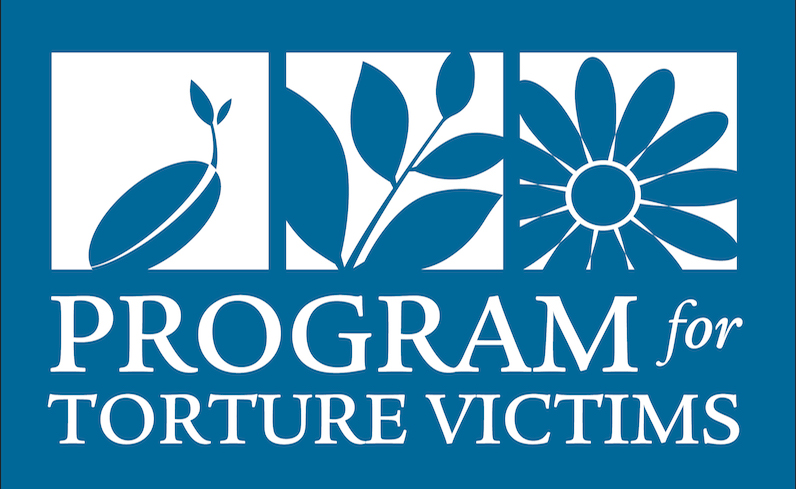By: Abigail Amaya and Tara Kwan
Seeking asylum in the United States is a long, stressful process. Fleeing from war to political persecution and abandoning family and family losses, asylum seekers arrive in a new country with hopes of a better future. Often, the past and current journey that asylum seekers endure lead them to experience mental health problems like anxiety, depression, and post-traumatic stress disorder. Moreover, as new arrivals in the United States, the refugee, asylum-seeking, and immigrant populations face difficulties accessing culturally sensitive and trauma-informed mental healthcare resources in their language.
PTV hosts weekly Rainbow Resilience groups on Mondays as a space for survivors to connect and discuss topics that spark interest, such as American fashion, fun activities in Southern California, and coping with stress while awaiting the asylum decision. We discovered the tremendous role that soccer had in our asylum seekers’ lives during one of these groups, so we interviewed three of our soccer-playing survivors. It was surprising to listen to the similarities between their passionate responses, and so let us share that joy and warmth.
John Sande (he/him/his) came from Cameroon and is seeking political asylum in the United States. At seven years old, John started playing soccer in his community. Using banana leaves, sticks, and mud, he would mold them into balls. Playing soccer in the dirt barefoot has given him the fondest memories as a child. John has grown apart from his niche of goalkeeping with age but not from his love for soccer and continues to play on defense. Most recently, his passion for soccer helped him navigate the way to the United States. From Ecuador to Colombia to Panama, through the dangers of the jungle, John endured life-changing hardships that continue to torment him today. Although language and culture barriers existed, he found friends in Panamanian communities that welcomed him and encouraged him to join their soccer games. Immigration officers also joined their games, decreasing fear of their presence amongst the immigrant community. The same courage to play followed him to the detention centers, where other immigrants, too, found soccer as a healing mechanism. Currently, to keep his passion alive, John plays club soccer two to three times a week in a stable, safe environment where he feels the happiest. Soccer has the engine that keeps John going. It makes him feel more than love, more than resilience; it’s indescribable.
In the 1990s, Alex (he/him/his), a seven-year-old boy, was at summer camp in the post-Soviet republic. During his time spent there, he was intrigued by the dramatics of soccer in the 1992 European Championship in Sweden. From penalty shootouts to soccer players bleeding from their heads, soccer made a great impression on Alex. After watching such spectacular games, he knew he was destined to pursue soccer. Shortly after, Alex’s dad gifted him a soccer ball that would kick start his passion. Alex is now an asylee from the post-Soviet republic. Like John, Alex has been playing soccer since the age of seven, competing and scoring like no other. He compares watching soccer with watching a great movie. When Alex is not on the field stressed about goalkeeping, he feels refreshed, reloaded, and rejuvenated. Aside from being a passion, soccer served as a distraction for his asylum process. After downloading JustPlay!, an app for pick-up soccer games, he became himself again. Suddenly, the depression about immigration issues diminished. Currently, Alex works scouting soccer players for clubs and teams – he cannot imagine life without a soccer ball.
Another seven-year-old boy in Uganda is training on a soccer team for the first time. Geofrey’s cousin invited him to play for her team, and all her teammates doubted his ability to play. However, he gave that game all his best, and once the game was over, everyone saw how much potential Geofrey had and he has been playing soccer ever since. His happiness is everlasting, and that feeling is unforgettable! Like John, Geofrey (he/him/his) is also seeking political asylum in the United States. Geofrey believes what defines soccer is where you put your foot on the ball and where you pass the ball. That alone has helped keep him going throughout his asylum process. When he arrived in the United States, people were rude to him. Geofrey learned to brush it off through the game; once you get on the field, it is just about playing. While in the US, he patiently waits at home until it is time to play soccer. He plays once a week on Saturdays with friends. Although he is the only African-American player on his team, he feels welcomed knowing that the crowd and even the players feel comfortable watching him play. Once his teammates drop him off at home, he can’t wait to play the following Saturday.
Sports promote community and passion. Soccer builds tenacity, resilience, and amiability, even more so when navigating the asylum process.
That is what John, Alex, and Geofrey bring to PTV.
The PTV soccer team is coming to a city near you! PTV’s starting lineup: the goalkeeper, Alex; defender, John; and forward, Geofrey.
You don’t want to miss watching our soccer stars play because when they come together, they are indestructible!
*John, Alex, and Geofrey would like to thank PTV for their work in their asylum process and continuous healing.
Possibly helpful sources!
How sport for development and peace can transform the lives of youth
Sport for Development and Peace
https://www.un.org/development/desa/dspd/sport-development-peace.html
Maybe we can structure our story to be similar to this?
As U.S. cuts refugee numbers, African teens find brotherhood on a Texas soccer team Legal immigration: African teen refugees find brotherhood in soccer
Sport, Refugees, and Forced Migration: A Critical Review of the Literature https://www.frontiersin.org/articles/10.3389/fspor.2019.00047/full

